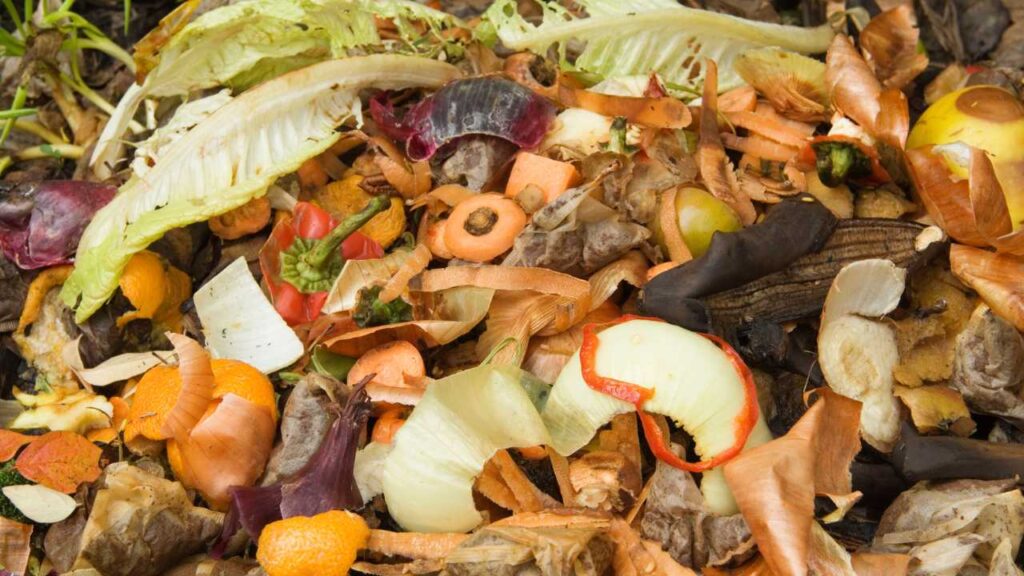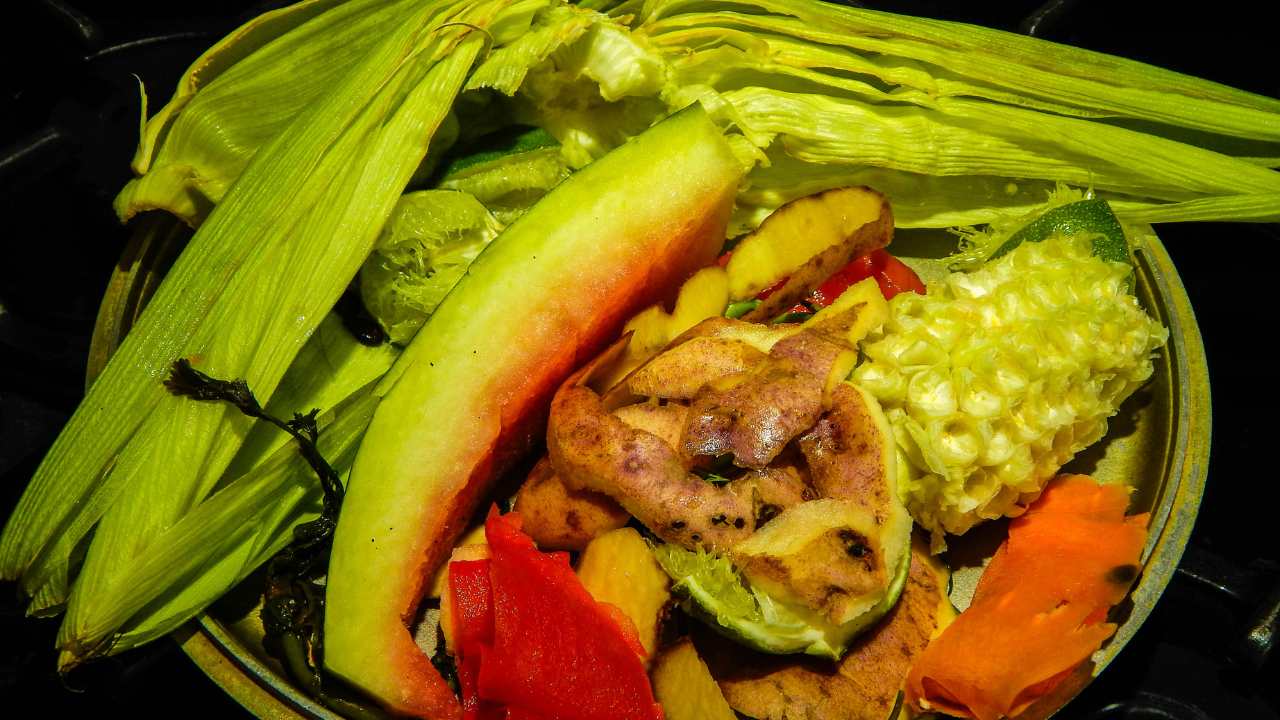Yes, you can compost kitchen scraps easily at home for nutrient-rich soil for your garden.
By composting organic waste like fruit and vegetable peels, coffee grounds, and eggshells, you can reduce waste and enhance your garden’s fertility.
Composting kitchen scraps not only benefits your plants but also contributes to reducing landfill waste and greenhouse gas emissions.
It’s a sustainable and eco-friendly way to dispose of organic materials while creating a natural fertilizer for your garden.
With a simple composting setup, you can turn your kitchen scraps into valuable resources for your plants and the environment.
Benefits Of Composting Kitchen Scraps
Composting kitchen scraps is not only an eco-friendly practice but also comes with numerous benefits.

By converting food scraps into nutrient-rich compost, you can contribute to enriching the soil, reducing waste, and saving money.
Let’s delve into the advantages of composting kitchen scraps.
Enriches The Soil
Composting kitchen scraps enriches the soil by adding essential organic matter and nutrients.
This process increases the soil’s ability to retain moisture and promotes the growth of healthy plants.
The nutrient-rich compost acts as a natural fertilizer, enhancing soil structure and promoting beneficial microbial activity.
Reduces Waste
Composting kitchen scraps reduces the amount of organic waste sent to landfills, where they would release methane, a potent greenhouse gas.
By diverting these scraps from landfills, you can minimize the environmental impact and contribute to sustainable waste management.
This lowers the carbon footprint and supports a cleaner environment.
Saves Money
Composting kitchen scraps can lead to substantial cost savings.
By producing your compost, you reduce the need for purchasing commercial fertilizers and soil conditioners.
Additionally, composting reduces the frequency of waste collection services, leading to potential cost savings on waste disposal.
What Kitchen Scraps Can Be Composted?

What kitchen scraps can be composted?
Fruit And Vegetable Peelings
Coffee Grounds And Filters
Coffee grounds and filters are excellent for composting
Eggshells
Eggshells are beneficial additions to your compost pile
Tea Leaves And Bags
Tea leaves and bags can also be composted
How To Compost Kitchen Scraps
Learning how to compost kitchen scraps is a simple and eco-friendly way to reduce waste and enrich your garden soil.
By recycling food scraps, you can create nutrient-rich compost that benefits your plants and the environment.
Start A Compost Pile Or Bin
- Choose a suitable location for your compost pile or bin.
- Layer kitchen scraps with brown material like leaves or paper.
- Ensure proper aeration and drainage for the compost.
Mix In Other Compostable Materials
- Add grass clippings, yard waste, and coffee grounds to the mix.
- Balancing green (nitrogen-rich) and brown (carbon-rich) materials is important.
- Avoid adding meat, dairy, and oily foods to your compost.
Monitor The Moisture Levels
Check the moisture content regularly in your compost pile by squeezing a handful of material.
It should be damp but not waterlogged. Adjust accordingly to keep it moist.
Turn The Compost Regularly
- Turning the compost helps aerate it and speed up decomposition.
- Use a pitchfork or shovel to mix the materials thoroughly.
- Ensure each part of the pile gets enough oxygen and moisture.
Common Mistakes To Avoid While Composting Kitchen Scraps
Composting kitchen scraps is a great way to reduce waste, but there are some common mistakes to avoid.
Make sure to balance your compost with a mix of greens and browns, avoid adding meat and dairy, and turn the compost regularly to promote decomposition.
Adding Meat Or Dairy Products
Using Excessive Amounts Of Oil Or Fats
Not Balancing The Carbon And Nitrogen Ratio
“`
Composting kitchen scraps is an eco-friendly way to reduce waste and create nutrient-rich soil for your garden.
However, there are common mistakes to avoid while composting kitchen scraps.
Knowing what not to compost can help you maintain a healthy and efficient compost pile.
Adding meat or dairy products
When composting kitchen scraps, avoid adding meat or dairy products.
These can attract pests, produce unpleasant odors, and take longer to break down compared to plant-based materials.
It’s best to stick to fruit and vegetable scraps, coffee grounds, eggshells, and yard waste for a successful compost pile.
Using excessive amounts of oil or fats
Excessive amounts of oil or fats can slow down the composting process and create an unpleasant smell.
While some fats are natural by-products of certain foods, it’s essential to balance them with other organic materials to avoid overwhelming your compost pile.
Not balancing the carbon and nitrogen ratio
Maintaining a proper balance of carbon and nitrogen is crucial for successful composting.
Too much carbon-rich material, such as dry leaves or paper, can slow down decomposition, while too much nitrogen-rich material, like food scraps, can lead to a smelly and slimy compost pile.
Aim for a ratio of about 25-30 parts carbon to 1 part nitrogen for optimal results.
By avoiding these common mistakes, you can ensure that your composting efforts are effective and environmentally friendly. Happy composting!
“`
Frequently Asked Questions Of Can You Compost Kitchen Scraps
Can You Compost Kitchen Scraps?
Yes, you can compost kitchen scraps like fruit and vegetable peels, coffee grounds, and eggshells.
What Kitchen Scraps Can I Compost?
You can compost a variety of kitchen scraps, including fruit and vegetable scraps, coffee grounds, tea bags, and nutshells.
How Do I Compost Kitchen Scraps?
To compost kitchen scraps, create a compost pile or use a compost bin. Layer the scraps with brown materials like leaves and mix regularly.
Why Should I Compost Kitchen Scraps?
Composting kitchen scraps reduces waste, enriches soil, and helps promote a healthier environment by reducing methane emissions from landfills.
How Long Does It Take For Kitchen Scraps To Compost?
The time it takes for kitchen scraps to compost depends on various factors such as temperature, moisture levels, and the size of the scraps.
Generally, it can take several months to a year.
Can I Compost Meat And Dairy Scraps?
It is not recommended to compost meat and dairy scraps as they can attract pests and create unpleasant odors.
Stick to composting fruit and vegetable scraps instead.
Should I Compost Citrus Peels?
Yes, citrus peels can be composted. However, they take longer to break down compared to other kitchen scraps, so consider chopping them into smaller pieces.
Can I Compost Cooked Food Scraps?
Yes, you can compost cooked food scraps.
Just make sure to avoid adding excessive amounts of oils, fats, and sauces, as they can slow down the composting process.
What Mistakes Should I Avoid When Composting Kitchen Scraps?
Avoid adding too much of one type of kitchen scrap, using scraps that are too large or too small, and not regularly turning or aerating the compost pile or bin.
Can I Use Compost Made From Kitchen Scraps In My Garden?
Yes, you can use compost made from kitchen scraps in your garden.
It provides essential nutrients to plants and helps improve soil structure.
Conclusion
Composting kitchen scraps is a simple way to reduce waste and enrich your garden.
By diverting organic matter from landfills, you can promote a healthier environment.
With the right balance of green and brown materials, you can create nutrient-rich compost for your plants.
Start composting today and make a positive impact on the planet and your garden.

